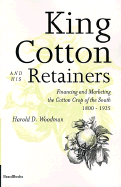
|
King Cotton and His Retainers: Financing and Marketing the Cotton Crop of the South, 1800-1925
By Harold D. Woodman
2000/08 - Beard Books
1893122514 - Paperback - Reprint - 418 pp.
US$34.95
A stark reminder of the difficulties of financing a one-crop agrarian economy.
Publisher Comments
Although historians have acknowledged the dominant influence of cotton on the Southern economy, they have paid scant attention to the marketing of this staple crop. In this thorough study of the cotton factorage system of the old South and the post-Civil War crop lien system crop, the author reveals not only the economic intricacies of the systems, but also the far-reaching effects on Southern political and social life.

From Booknews
Reprinted as a classic (with a new introduction by the author) despite its relatively recent date of original publication (1968, U. of Kentucky Press). As the first systematic examination of the middlemen who financed and marketed the region's all-important cotton crop,
Woodman's has become the standard work on the subject. Annotation c. Book News, Inc., Portland, OR (booknews.com)
From Southern Classics, http://www.cla.sc.edu/ISS/classics/titles.html
A thorough study of the cotton factorage system of the Old South and the crop-lien system of the postwar era, King Cotton and His Retainers traces the economic, political, and social implications of the processes by which the dominant southern staple came to market. Harold D. Woodman's new introduction explains the context in which he wrote his authoritative monograph, outlines its connections to the historiography of the past three decades, and identifies promising opportunities for new research.

Harold D. Woodman is Professor Emeritus of History and American Studies and Program Chair from 1981-1993 at Purdue University

|
Preface |
vii |
|
Acknowledgments |
xi |
| ANTE BELLUM |
| Part 1. |
The Cotton Factorage System |
3 |
| Chapter 1. |
The Rise of Cotton Factorage |
8 |
| Chapter 2. |
Selling the Crop |
15 |
| Chapter 3. |
Providing Plantation Supplies and Credit |
30 |
| Chapter 4. |
Banker, Bookkeeper, and Friend |
43 |
| Chapter 5. |
Commissions, Service Charges and Internet |
49 |
| Chapter 6. |
Planter-Factor Relations: The Law, Tradition and
Expediency |
60 |
| Part 2. |
Storekeepers, Itinerants and Bankers: Attendants to the
Factor |
73 |
| Chapter 7. |
The Country Storekeepers |
76 |
| Chapter 8. |
Itinerant Merchants |
84 |
| Chapter 9. |
Bankers and Planters |
98 |
| Chapter 10. |
Bankers and Factors |
114 |
| Part 3. |
Cotton Marketing and the Southern Economy |
127 |
| Chapter 11. |
The Need for Credit |
132 |
| Chapter 12. |
The Dependent South |
139 |
| Chapter 13. |
Cotton Factors and Storekeepers in a Dependent South |
154 |
| Chapter 14. |
Bankers in a Dependent South |
165 |
| Chapter 15. |
The Costs and Risk of Cotton Marketing |
176 |
| Chapter 16. |
Cotton Factorage and Southern Economic Development:
Conclusions |
187 |
| CIVIL WAR AND AFTER |
| Part 4. |
Wartime Cotton Trade |
199 |
| Chapter 17. |
Business, Not Quite as Usual |
204 |
| Chapter 18. |
Blockade-Running and Trade with the Enemy |
217 |
| Chapter 19. |
Internal Trade and Speculation |
225 |
| Chapter 20. |
Profits Realized and Profits Lost |
235 |
| Part 5. |
Economic Reconstruction |
243 |
| Chapter 21. |
The Return of King Cotton |
246 |
| Chapter 22. |
The Resurrection of the Cotton Factorage System |
254 |
| Chapter 23. |
The Decline of Cotton Factorage |
269 |
| Chapter 24. |
The Furnishing Merchant |
295 |
| Part 6. |
Cotton Marketing and the Economy |
315 |
| Chapter 25. |
An Agrarian "New South" |
319 |
| Chapter 26. |
The Farmer's Quest for Economic Independence |
334 |
| Chapter 27. |
The South Remains Dependent: Conclusions |
345 |
|
Appendix |
361 |
|
Bibliographical Notes |
369 |
|
Index |
375 |
|
